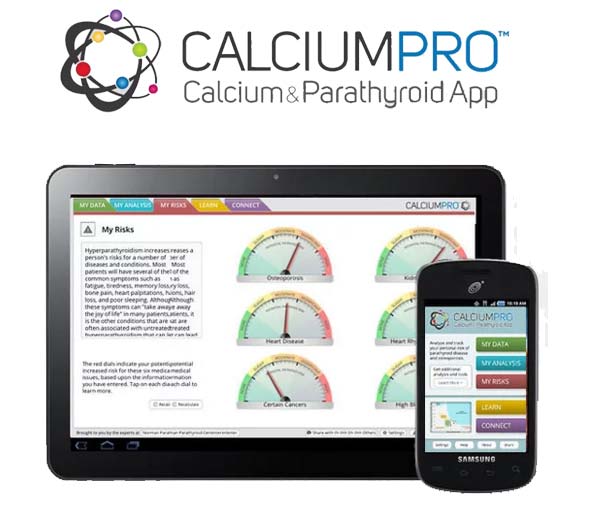The top 10 symptoms of hyperparathyroidism, presented with real patient examples

Primary hyperparathyroidism is a destructive disease caused by benign growths of the parathyroid glands. It is is characterized by high parathyroid hormone (PTH) production and causes accelerated bone loss, kidney injury, and it is associated with heart disease and stroke. People with hyperparathyroidism don’t live as long, or as well, as they should.
The mechanisms that control how calcium moves into, out of, and within our bodies are defective in hyperparathyroidism. This usually results in high blood calcium levels, thin bones, and high levels of calcium in the urine. Since calcium plays some role in nearly every bodily function, it is not surprising that many symptoms are associated with hyperparathyroidism.
Although these symptoms are easy to attribute to natural aging and other health issues, early recognition can lead to prompt diagnosis and treatment before serious organ damage.
The Top 10 Symptoms of Hyperparathyroidism:
- Fatigue
- “Brain fog”
- Bone and joint pain
- Heartburn
- Feeling old and weak
- Muscle cramps
- Insomnia
- Depression
- Palpitations
- Decreased libido and erectile dysfunction
First, what is the difference between and a sign and a symptom?
Although the terms “sign” and “symptom” are often used interchangeably, “signs” are observable characteristics and “symptoms” are sensations. Some will say that “signs” are observed by doctors and “symptoms” are reported by patients. Others will say that “signs” are objective and “symptoms” are subjective.
In a previous article, we discussed the top signs of hyperparathyroidism. These included bone loss, kidney stones, and high blood pressure. This blog will highlight the symptoms experienced by people with hyperparathyroidism who were treated at The Hospital for Endocrine Surgery.
Symptoms of Hyperparathyroidism: Fatigue
Ms. D. was a 68-year-old woman in Florida when she was incidentally found to have a high calcium level on routine blood testing. Her doctors instructed her to take vitamin D, and did not initially consider HPT.
At the time, Ms. D suffered from extreme tiredness, and she was told that it was due to natural “aging”. She said, “I would just fall asleep in the middle of the day” and “I didn’t have enough energy to hang a picture on the wall”. She was experiencing classic symptoms of hyperparathyroidism.
Several months later, testing revealed even higher calcium levels in her blood (13.1 mg/dL), in addition to a high PTH level (375 pg/mL). She underwent minimally invasive parathyroid surgery at the Hospital for Endocrine Surgery, at which time a left lower parathyroid adenoma was removed without complication.
Ms. D reports, “Now I have the energy to stay active. I swim and I use the elliptical machine at the gym. My doctors tell me that my bloodwork, including kidney function, calcium, and electrolytes are the best that they have been in many years."
“I have so much more strength than before the surgery. I can’t believe how lethargic I was. I have a grandchild to take care of, and it was important for me to keep my energy levels up when looking after them."
Symptoms of Hyperparathyroidism: “Brain Fog”
Ms. W was a 64-year-old woman from from New York who struggled with focus and memory. She described a “brain fog” that she had not experienced before, which started to interfere with her “day-to-day function”. She reported, “I was unable to find items in the grocery store and I got lost driving home”. Her family suspected that she was “showing signs of Alzheimer’s dementia”, but again, she was exhibiting hallmark symptoms of hyperparathyroidism.
Her tests revealed a high PTH level above 120 mg/dL in the context of a mildly elevated blood calcium level and a very high amount of calcium in her urine (above 500 mg/day).
Ms. W was diagnosed with hyperparathyroidism and underwent a routine surgery at The Hospital for Endocrine Surgery. A large and benign right lower parathyroid tumor was excised during that minimally invasive procedure. Direct functional testing of the tumor determined that its hormone production was greater than 20 times higher than a normal parathyroid gland.
In the months following surgery, Ms. W’s family noticed an improvement in her focus and memory, and she seems like she is “back to her normal self”. Her symptoms of hyperparathyroidism were virtually gone.
Symptoms of Hyperparathyroidism: Bone and joint pain
Ms. C was a 58-year-old woman in Colorado who reported that it “felt painful to walk” due to pain in both her lower legs. She was very self-conscious about showing her disability at work. She struggled to climb the three stairs at her front door of her house, and opted to use a handicap ramp.
Ms. C’s workup revealed only mildly elevated serum calcium levels (10.1-10.9 mg/dL). Her PTH levels were inappropriately elevated (53-60 pg/mL), but within the reference range provided on her lab reports. She reported, “My doctors told me that I was old and I needed to exercise more”. But as we know, bone pain is one of the most common symptoms of hyperparathyroidism.
We removed a benign parathyroid tumor from Ms. C. One year after surgery, she reports that her lower leg pain completely resolved. She reports that she is “significantly more active” now that her pain is gone. “I felt like was 92, and now I feel like my real age." Symptoms of hyperparathyroidism often resolve completely following parathyroid surgery.
Symptoms of Hyperparathyroidism: Heartburn
Mr. P was a 58-year-old man living in Florida when he was diagnosed with hyperparathyroidism. During his workup at the Hospital for Endocrine Surgery, he self-reported “heartburn”, which required medication. Additionally, he elevated the head of his bed and changed his diet to avoid waking up in the middle of the night with “horrific” chest discomfort. “I stopped eating many of the foods that I enjoy, including tomatoes."
Mr. P’s lab profile included a PTH level consistently over 130 pg/mL and a blood calcium that ranged between 10.2 and 11.5 mg/dL. He underwent an uneventful minimally invasive surgery at the Hospital for Endocrine Surgery, at which time a benign parathyroid tumor was removed.
After surgery, Mr. P reported resolution of the heartburn, which allowed him to discontinue his antacid medications. This was not surprising, as a previous study from the Norman Parathyroid Center demonstrated that most hyperparathyroid patients who take prescription medication for heartburn were able to stop the medication after successful parathyroid surgery. Heart burn is one of the symptoms of hyperparathyroidism that can be cured through surgery.
Symptoms of Hyperparathyroidism: Feeling old and weak
Ms. D was an 89-year-old woman in Florida who was so weak and debilitated that she could no longer live on her own. She was wheelchair bound and could not perform activities of daily living without assistance. Her care givers at the facility she lived in suggested that she be transferred to hospice care.
Ms. D’s lab testing revealed profoundly high calcium levels (13.1 mg/dL) and a high PTH level (87 pg/mL). She underwent an uneventful, minimally invasive parathyroid surgery at The Hospital for Endocrine Surgery.
Remarkably, Ms. D was able to walk again with a walker following curative surgery. The wheelchair is no longer needed. More importantly, she was able to return to her own home. Her daughter reported that she can even “drive to the grocery store”. Her daughter mentioned, “It’s amazing just how far down she went because of her parathyroid problem”.
Let me reiterate, Ms. D’s symptoms of hyperparathyroidism were so extreme that she almost entered hospice. With a simple outpatient operation, she got her life back!
Symptoms of Hyperparathyroidism: Muscle cramps
Ms. W was a 47-year-old and living in Canada when she was diagnosed with hyperparathyroidism. Her calcium level (over 11.5 mg/dL), PTH level (over 90 pg/mL), and high urinary calcium (over 280 mg/day) were classic for hyperparathyroidism. In addition to several other symptoms of hyperparathyroidism, she reported troublesome “muscle cramps” and was also told that she had “restless leg syndrome”.
Ms. W was told that she would have to wait over a year to get elective parathyroid surgery in Canada. This delay in treatment motivated her to seek a cure from The Hospital for Endocrine Surgery in Tampa. She underwent a curative parathyroid surgery without complication. At one year following the surgery, she reports that she no longer has muscle cramps or “restless legs” at night.
Symptoms of hyperparathyroidism: Insomnia
Ms. W was a 65-year-old woman living in Missouri when she was diagnosed with hyperparathyroidism, only after a screening test revealed that she had osteoporosis.
She reported “difficulty with sleeping” on her list of symptoms at the time. Her primary care provider attributed her difficulties with falling and staying asleep to “poor habits and lack of exercise”. Even healthcare providers sometimes miss the symptoms of hyperparathyroidism.
It is worth noting that several of the other symptoms of hyperparathyroidism can also contribute to insomnia. These include frequent urination, constipation, depression, and heartburn. Unfortunately, people with hyperparathyroidism and insomnia do not achieve much relief when each of these entangled symptoms are treated separately.
Ms. W reported, “I tried over the counter melatonin supplements and eventually prescription sleeping pills”. After achieving surgical cure from hyperparathyroidism, Ms. W was able stop taking sleep medications, demonstrating that curing the underlying problem is almost always a more effective approach than treating symptoms.
Symptoms of hyperparathyroidism: Depression
Ms. F is a 79-year-old woman in Florida who noticed that her “mood worsened to depression”, and it was not associated with other events or changes in her life. She struggled with motivation to do her housework and to maintain her yard. This was unusual for her, as she normally was “fiercely independent” and able to handle maintaining her house and yard without any help.
Her primary care doctor recognized that her calcium level was 11.0 mg/dL on routine bloodwork. Subsequent testing revealed that her PTH level was high at 74 pg/mL. The diagnosis of symptomatic pHPT was made, and she underwent removal of two parathyroid tumors, without event.
One year after surgery, Ms. F reports that she feels “back to normal” and is “no longer depressed”. She has no difficulties with handling her housework or yard. She is an active member of her church and reports her “moods are back to normal”. Although we may not generally think to associate symptoms of hyperparathyroidism with mental health, the two can certainly be linked.
Symptoms of hyperparathyroidism: Palpitations
Ms. M was a 65-year-old woman in Virginia who was incidentally found to have high calcium during a routine annual checkup. This prompted a workup that uncovered a high blood calcium over 11 mg/dL and PTH levels over 130 pg/mL. Her labs were classic for pHPT.
Around the time of diagnosis, Ms. M reported, “If I was lying on my sofa in a state of quietness, I would feel my heart flutter”. She could recognize an occasional irregular beat when she checked her own pulse. I was worried if I should go to a cardiologist”.
Ms. M underwent an uneventful removal of a large right upper parathyroid tumor. The intraoperative assessment of this tumor indicated that its hormone production was 50 times higher than what is seen in normal glands.
Following curative parathyroid surgery at The Hospital for Endocrine surgery, she no longer has heart palpitations. She reports that, “The surgery stopped all that”.
Symptoms of hyperparathyroidism: Decreased libido and erectile dysfunction
Mr. R was a 48-year-old man living in Florida. He reported a decrease in sex drive and received medication for erectile dysfunction. He was briefly treated for “low testosterone syndrome” with almost no improvement.
His primary care provider overlooked that his serum calcium level was mildly, but persistently, elevated. Several years later, a PTH level was found to be over 100 pg/mL, establishing the diagnosis of hyperparathyroidism.
After surgical cure of hyperparathyroidism, Mr. R no longer needed medication for erectile dysfunction and reported substantial improvements in libido.
What should you do if you have symptoms of hyperparathyroidism?
The evaluation for hyperparathyroidism should start with a simple blood test for calcium and parathyroid hormone levels. In the vast majority of cases, these two simple tests are enough to establish or exclude hyperparathyroidism.
If you feel you may be suffering from hyperparathyroidism, fill out this "new patient form" to schedule a consultation and become our patient. You will be contacted by one of our expert parathyroid surgeons to discuss the details of your case.
The only cure for hyperparathyroidism is parathyroid surgery. If you are worried about undergoing surgery- don't be! Check out this video of our minimally invasive parathyroid surgery and see for yourself.
Additional Resources:
- Browse a complete list of symptoms of hyperparathyroidism.
- Learn more about the Norman Parathyroid Center.
- Read more articles like this one on the Parathyroid blog.
- Become our patient.
- Check out our sister surgeons at the Clayman Thyroid Center, the Scarless Thyroid Surgery Center and the Carling Adrenal Center. We are now united under one roof, operating at the Hospital for Endocrine Surgery in Tampa, Florida.




